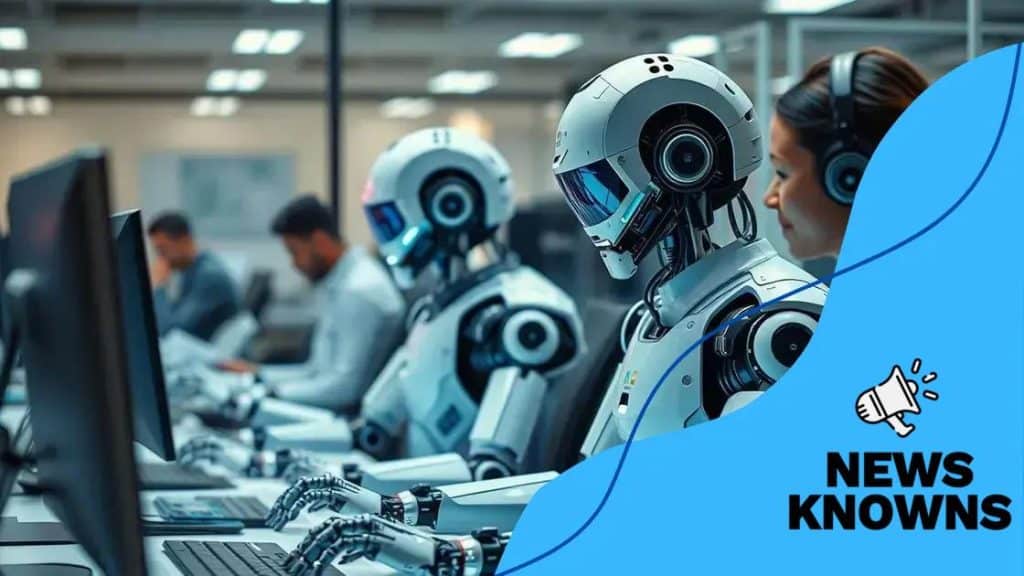The impact of AI on job automation in 2025

Anúncios
The impact of AI on job automation in 2025 will reshape workplaces by automating repetitive tasks, creating new job roles, and requiring workers to continuously adapt and develop both technical and soft skills.
The impact of AI on job automation in 2025 is a topic that’s impossible to ignore. As technologies advance, many wonder how this will affect their careers and daily lives. Let’s dive into these changes and what they mean for us.
Anúncios
Understanding AI and job automation
Understanding how AI works with job automation is crucial for anyone navigating the workforce today. As technology evolves, many industries are adapting to the influence of artificial intelligence, which can change the nature of work.
How AI Changes the Workplace
AI is not just a buzzword. It fundamentally redefines tasks in many sectors. For instance, jobs that involve repetitive tasks are quickly being automated. This shift allows employees to focus on more complex and creative responsibilities.
Key Benefits of AI in Automation
- Increased efficiency and productivity.
- Reduction in human error and improved accuracy.
- Ability to analyze large data sets quickly.
- Enhanced decision-making processes.
Furthermore, while some jobs may be lost to automation, new roles are emerging that require different skill sets. For example, we now see demand for specialists who can manage and interpret AI systems. This transition emphasizes the importance of adapting and learning to stay relevant.
Anúncios
It’s also important to note that AI can support workers by providing them with tools that enhance their capabilities. Automation takes over tedious tasks, enabling people to spend more time on creative projects or client interactions. In essence, AI can be a partner that helps humans achieve better outcomes.
The Future of AI and Job Roles
As we look to the future, jobs will continue to evolve alongside AI technologies. Many organizations are investing in training programs to prepare their employees for these changes. Skills such as critical thinking and emotional intelligence will become increasingly valuable, as they are challenging for AI to replicate.
Through understanding and leveraging AI, businesses can create a more efficient workplace that benefits both employees and employers. Ultimately, the landscape of work will change, but with the right approach, individuals and companies can thrive in this new environment.
Current trends in job automation
Current trends in job automation reflect how rapidly technology is evolving and impacting the workforce. Many industries are integrating AI and automation to streamline processes, enhance productivity, and reduce costs. Understanding these trends is key for professionals looking to navigate the changing job landscape.
Growing Adoption of AI Tools
More companies are leveraging AI tools to automate repetitive tasks. This transition allows employees to focus on creativity and problem-solving. Industries such as manufacturing and retail have seen significant increases in automation.
Impact on Employment
- Certain jobs are being displaced due to automation.
- New roles are emerging, requiring higher skill levels.
- Workers are increasingly expected to adapt to new technologies.
- Training programs are becoming essential to prepare for changes.
As automation becomes more widespread, the demand for tech-savvy workers will rise. Employers are prioritizing candidates with skills in managing and interpreting automated systems. It’s also important for workers to reskill and upskill to remain competitive.
Another notable trend is the rise of collaborative robots, or cobots, which work alongside human employees. These robots are designed to assist with tasks, making work more efficient and safer. They help reduce workplace injuries and allow for more streamlined collaboration.
Sector-Specific Innovations
In healthcare, automation is enhancing patient care and operational efficiency. For instance, AI is used for scheduling, diagnostics, and patient monitoring. This frees healthcare professionals to focus on direct patient care.
In finance, algorithms are increasingly handling data analysis and risk assessment. This trend allows financial analysts to concentrate on strategic decision-making and client relationships. Overall, as sectors continue to innovate, job automation will play a critical role in shaping future work environments.
How AI is reshaping job roles

AI is reshaping job roles across various industries, changing how we work and the skills we need. As artificial intelligence becomes more integrated into daily tasks, job descriptions are evolving to accommodate new technologies.
Emergence of New Job Functions
With the rise of AI, many traditional job roles are being adapted or replaced. For example, roles that require data management are increasingly relying on AI tools to process information faster and more accurately. This shift creates new positions focused on overseeing automated systems.
Skills in Demand
- Data analysis: Understanding and interpreting data generated by AI.
- Programming: Skills in coding and developing AI applications.
- Project management: Coordinating projects that involve both human and AI teams.
- Creative problem-solving: Adapting to changes in workflow and finding innovative solutions.
As AI takes over more routine tasks, employees are encouraged to develop soft skills like communication and teamwork. These skills are vital for collaborating with AI systems and other team members. Workers who can adapt will find ample opportunities in this transforming landscape.
Moreover, industries like healthcare are seeing roles dedicated to managing patient data and using AI for diagnostics. This not only improves efficiency but also enhances patient outcomes. Positions such as AI trainers, who teach machines to understand specific tasks, are becoming popular.
The Human-AI Collaboration
Importantly, AI is not replacing humans but rather augmenting their capabilities. The best outcomes occur when humans and AI work together, leveraging each other’s strengths. For instance, AI can analyze trends and provide insights, while human workers can focus on decision-making and emotional intelligence.
In this changing work environment, continuously learning and adjusting to new technologies will be imperative. The future of work is dynamic, and those who embrace change will thrive as AI reshapes job roles.
Challenges of AI in the workplace
Challenges of AI in the workplace can significantly impact how organizations function. While AI has the potential to improve efficiency, it also raises several important issues that need to be addressed.
Integrating AI into Existing Systems
One major challenge is the integration of AI into established workflows. Many companies have existing systems that may not easily adapt to new AI tools. This can lead to resistance among employees who are accustomed to traditional methods.
Employee Training and Skills Gap
- Many workers may lack the technical skills to operate AI systems.
- Training programs are often needed to help employees adapt.
- There can be a generational divide in tech proficiency.
- Balancing the need for advanced skills with budget constraints can be tough.
Furthermore, the rapid pace of technological change means that training must be continuous. This can create stress among employees who feel they need to constantly learn new skills to keep up.
Job Security Concerns
Another challenge involves job security. Workers are often concerned that AI and automation could replace their jobs. When tasks become automated, many fear they won’t have a role in the future workplace. Organizations need to communicate how AI will augment rather than replace human workers.
This understanding can help reduce anxiety and make transitions smoother. Employers should highlight the value of human skills, like creativity and empathy, which are difficult for machines to replicate.
Data Privacy and Ethical Considerations
AI systems often require large amounts of data to function effectively. This raises concerns about data privacy and ethical use. Organizations must ensure they handle data responsibly, following regulations and protecting employees’ personal information. Failure to address these concerns could lead to significant legal and reputational risks.
Finally, fostering a culture that embraces AI while addressing these challenges is critical. Open lines of communication and ongoing support can empower employees to feel confident in the evolving workplace.
Preparing for a future with AI
Preparing for a future with AI is essential for both individuals and organizations. As technology continues to evolve, being proactive is key to thriving in an AI-driven economy.
Emphasizing Continuous Learning
One of the most important steps is to prioritize continuous learning. With the rapid pace of change, skills can quickly become outdated. Engaging in training programs helps workers stay relevant in their fields. Many online resources are available to learn about AI and related technologies.
Developing Key Skills
- Technical skills in programming and data analysis.
- Soft skills such as critical thinking and communication.
- Adaptability to new tools and processes.
- Collaboration skills to work effectively with AI systems.
Moreover, organizations should foster a culture that values innovation and experimentation. Encouraging employees to explore new ideas can lead to unexpected breakthroughs. This type of environment helps teams feel more comfortable transforming their processes and integrating AI technologies.
In addition to individual efforts, companies should invest in AI literacy across all levels. Workshops and seminars can help everyone understand AI’s potential and limitations. Educated employees can better contribute to discussions on implementing AI in their operations.
Fostering Collaboration Between Humans and AI
Preparing for a future with AI also means creating a collaborative atmosphere. Humans and machines can complement each other’s strengths. As AI handles data-heavy tasks, human workers can focus on strategy and creativity. Understanding how to work alongside AI will be crucial, as many roles will require collaboration.
Organizations can lead this effort by restructuring teams to incorporate AI effectively. Employees should be encouraged to experiment with AI applications in their daily tasks. This hands-on approach can demystify technology and encourage acceptance.
Staying Updated with Industry Trends
Finally, keeping an eye on industry trends is critical. Following market shifts and new technologies helps both workers and companies recognize opportunities and challenges. This awareness can drive strategic planning, ensuring that both individuals and organizations are prepared for changes that come with AI integration.
In conclusion, as we prepare for a future with AI, it’s clear that adaptability and continuous learning will be essential. Embracing technological advancements can help individuals and organizations thrive in a rapidly changing environment. By developing new skills, fostering collaboration between humans and machines, and staying informed about industry trends, everyone can benefit from the opportunities AI presents. Together, we can shape a workplace that leverages innovation for a better tomorrow.
\n\n\n
\n
\n
FAQ – Frequently Asked Questions about AI and Job Automation
How can AI improve productivity in the workplace?
AI automates repetitive tasks, allowing employees to focus on more strategic and creative work, ultimately increasing productivity.
What skills should I develop to work alongside AI?
Focus on both technical skills, like data analysis and programming, and soft skills, such as communication and adaptability.
How can organizations effectively integrate AI?
Companies should provide training, emphasize collaboration between teams and AI, and ensure they have the right tools and systems in place.
What are the main challenges of using AI in the workplace?
Challenges include integrating AI into existing systems, addressing employee concerns about job security, and ensuring data privacy.





